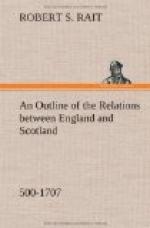of the Kirk than he would be".[83] Andrew Melville
had told him that “there is twa kings and twa
kingdomes in Scotland. Thair is Chryst Jesus the
King and his Kingdom the Kirk, whase subject King
James the Saxt is: and of whase Kingdom nocht
a King, nor a lord, nor a heid, bot a member."[84]
James had done his utmost to assert his authority
over the Church. He had tried to establish Episcopacy
in Scotland to replace the Presbyterian system, and
had succeeded only to a very limited extent. “Presbytery”,
he said, “agreeth as well with a king as God
with the Devil.” So he went to England,
not only prepared to welcome the episcopal form of
church-government and to graciously receive the episcopal
adulation so freely showered upon him, but also determined
to suppress, at all hazards, “the proud Puritanes,
who, claining to their Paritie, and crying, ‘We
are all but vile wormes’, yet will judge and
give Law to their king, but will be judged nor controlled
by none".[85] “God’s sillie vassal”
was Melville’s summing-up of the royal character
in James’s own presence. “God hath
given us a Solomon”, exulted the Bishop of Winchester,
and he recorded the fact in print, that all the world
might know. James was wrong in mistaking the English
Puritans for the Scottish Presbyterians. Alike
in number, in influence, and in aim, his new subjects
differed from his old enemies. English Puritanism
had already proved unsuited to the genius of the nation,
and it had given up all hope of the abolition of Episcopacy.
The Millenary Petition asked only some changes in
the ritual of the Church and certain moderate reforms.
Had James received their requests in a more reasonable
spirit, he might have succeeded in reconciling, at
all events, the more moderate section of them to the
Church, and at the very first it seemed as if he were
likely to win for himself the blessing of the peace-maker,
which he was so eager to obtain. But just at
this crisis he found the first symptoms of Parliamentary
opposition, and here again his training in Scotland
interfered. The Church and the Church alone had
opposed him in Scotland; he had never discovered that
a Parliament could be other than subservient.[86]
It was, therefore, natural for him to connect the
Parliamentary discontent with Puritan dissatisfaction.
Scottish Puritans had employed the General Assembly
as their main weapon of offence; their English fellows
evidently desired to use the House of Commons as an
engine for similar purposes. Therefore said King
James, “I shall make them conform themselves,
or I will harry them out of the land, or else do worse”.
So he “did worse”, and prepared the way
for the Puritan revolution. If the English succession
enabled the king to suppress the Scottish Assembly,
the Assembly had its revenge, for the fear of it brought
a snare, and James may justly be considered one of
the founders of English dissent.




